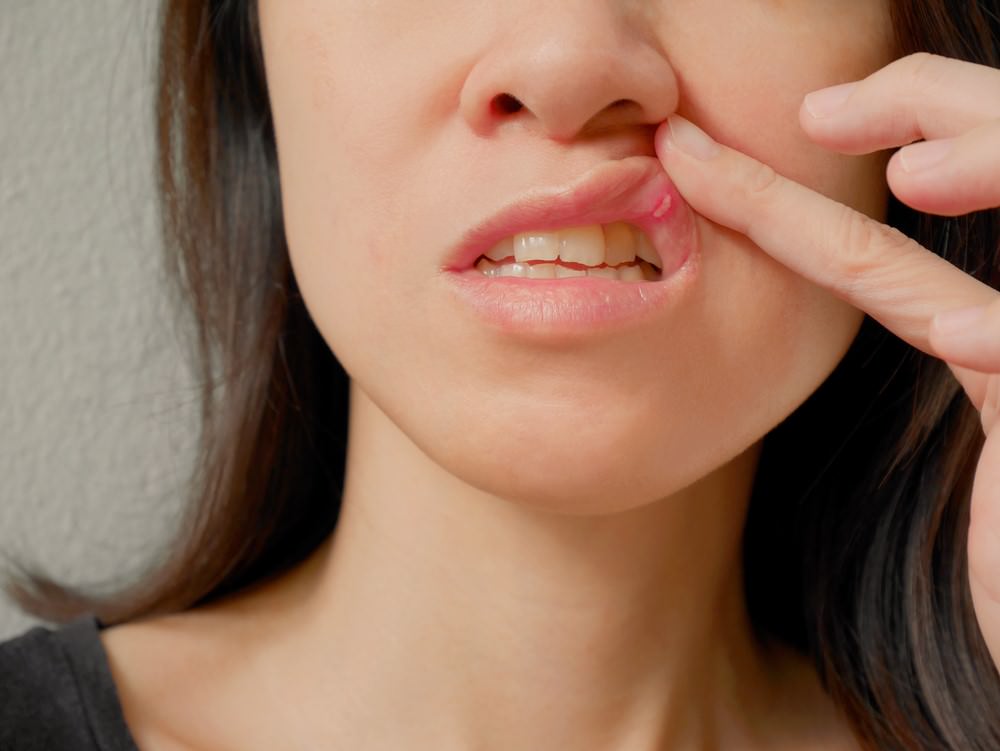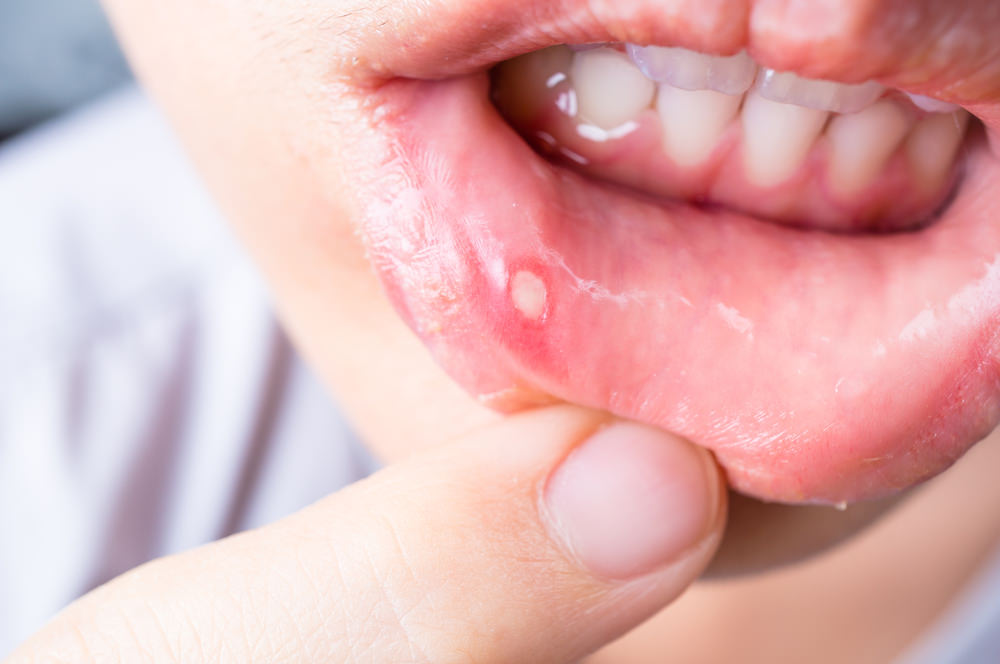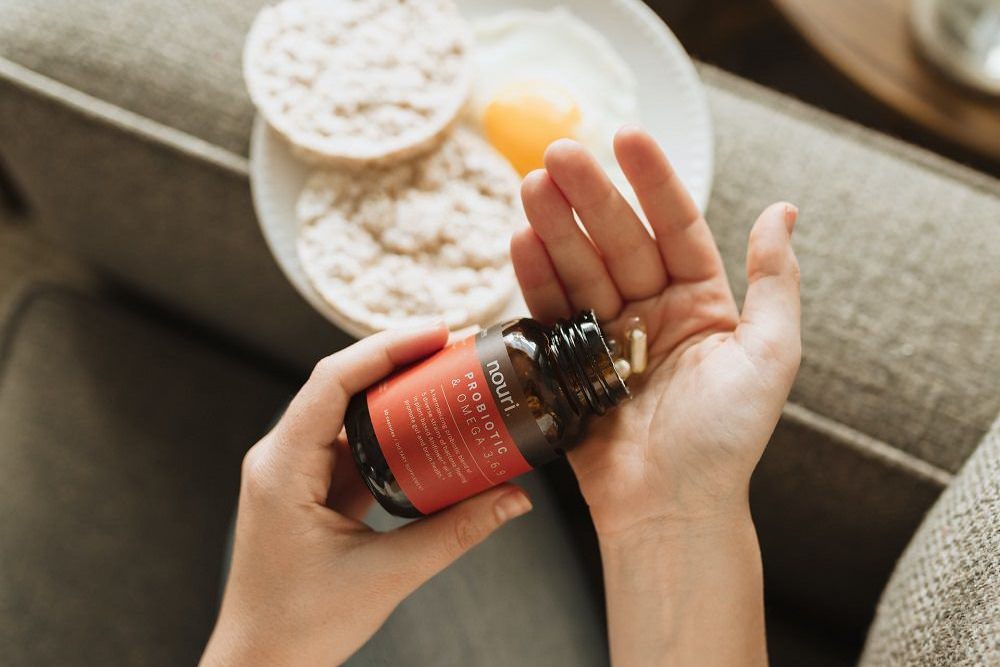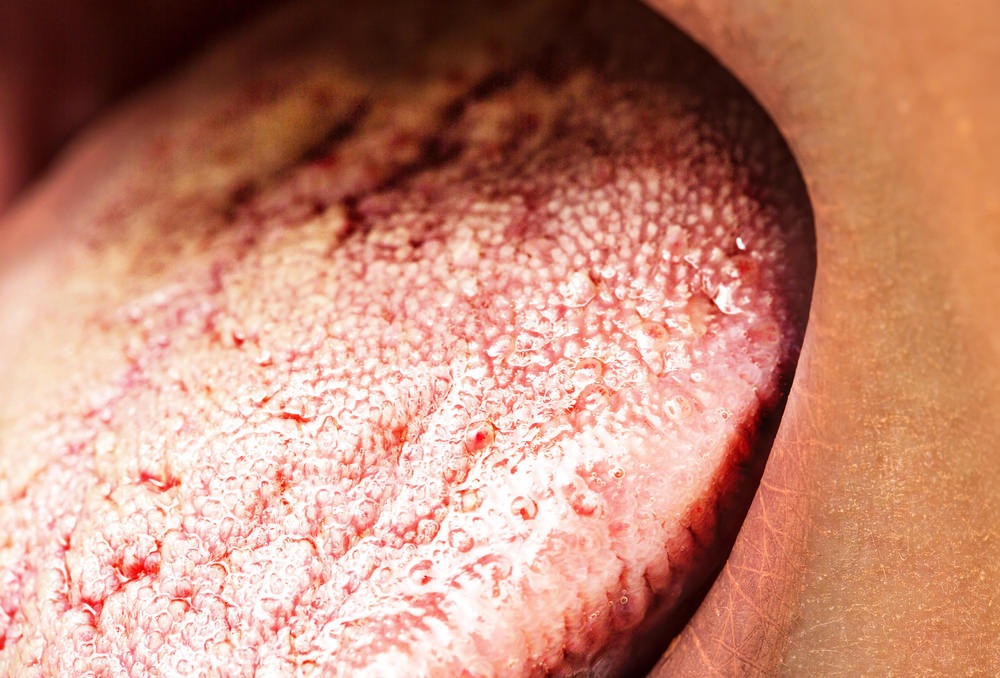Mouth Ulcers – Everything Covered
A mouth ulcer (also called canker sores, or an aphthous ulcer) is a small, painful blister inside your mouth.
But there is more than one type of mouth ulcer – below is the list of different mouth ulcers.
• Minor ulcers.
• Major ulcers, and
• Herpetiform ulceration (HU).
So, let’s get straight into discussing factors such as their causes, how to treat them, and how you can prevent getting them at all.
What is the Difference in Mouth, Tongue, and Lip Ulcers?
Mouth ulcers can show up on the bottom of your mouth, on your tongue, inside your lips or cheek, or even on your gums.
So, essentially there is no difference between mouth, tongue, and lip ulcers.
They are just a sore that is white or grey in colour and will cause you discomfort, especially when you:
- Talk
- Eat
- Drink
- Brush your teeth
But, as mentioned, there are 3 main types of mouth ulcers. So, let’s delve into these a little deeper.
Minor Ulcers
Minor Ulcers are the most common sort of ulcer. They can range in size, anywhere between 2mm to 8mm wide.
They can come as a single ulcer or can form in a cluster.
Generally speaking, they will cause you very little pain, and take roughly 2 weeks to heal.
Major Ulcers
Major Ulcers are less common than Minor Ulcers.
They are also larger – typically 5mm or more but are irregular in shape.
They might be raised, and make a hole that goes deeper into the tissue than Minor Ulcers.
They will come either alone or in a pair.
They can cause you a lot of pain, particularly when eating or drinking.
They might last anywhere from 2 weeks to a few months.
When they do finally depart, expect that they will probably leave behind scar tissue.
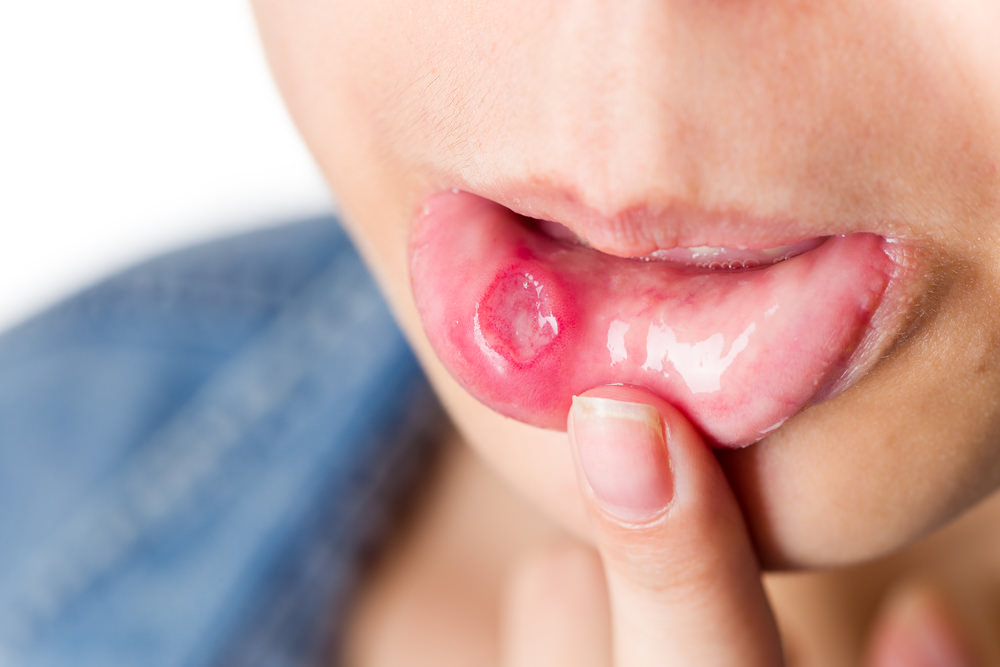
Herpetiform Ulceration (HU)
Called Herpetiform Ulcers, these are a subtype of mouth ulcers.
They are named “Herpetiform” as they look like cold sores, which are associated with the herpes simplex virus.
However, know that these have nothing to do with the herpes simplex virus.
They can come about when several lesions merge together, forming large ulcers that are irregular in shape.
They tend to reoccur very quickly, as it seems to be the case that this condition never improves.
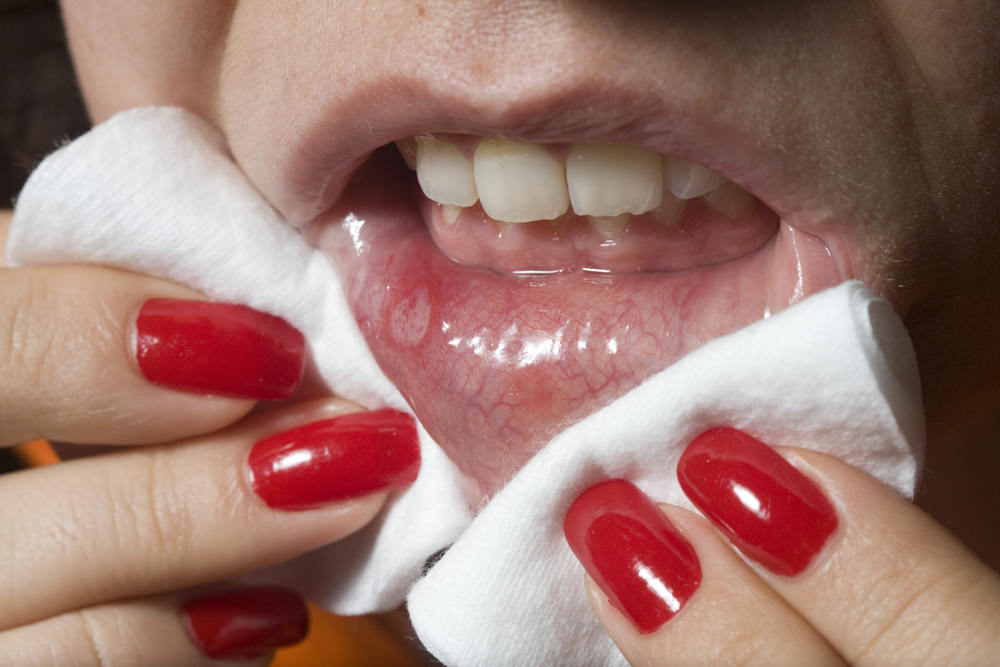
A herpetiform ulceration
Best Cure for a Mouth Ulcer
Most small mouth ulcers will heal on their own, without the need for help.
But if you:
• Have several ulcers
• Very big ulcers
• Have ulcers that are causing you severe pain
• Come down with a fever
• Have an ulcer that does not heal after three weeks
• Have ulcers that are spreading
You may need medical assistance, and I suggest that you see your Doctor or Dentist as soon as possible.
They can identify them with a visual examination, and in some circumstances, you may need tests to check for other health problems.
This is as mouth ulcers can be a sign of more severe conditions, that require urgent medical treatment, such as:
• Celiac disease
• Inflammatory bowel disease
• Diabetes
• HIV/AIDS
So, for example, your Dentist will be able to make sure that your issue is definitely a mouth ulcer, and not a tooth abscess, or a rare form of oral cancer.
Once they have determined that it is in fact just a more painful or frequently recurring mouth ulcer, they will be able to prescribe you with a solution that will minimise the swelling, and ease your pain.
Treatments they can prescribe include:
- Prescription medications – This will be an antimicrobial ointment, paste, cream, liquid, or gel.
- Medicated mouthwash – If you have several ulcers, mouthwash might be easier than putting gel on every single sore.
They will tend to contain the steroid dexamethasone, which will decrease pain and swelling, or lidocaine, a numbing medication which helps to reduce pain.
List of Treatment Options for a Mouth Ulcer
Most mouth ulcers are harmless, and treatment generally is not necessary, as they will heal on their own.
But if you get them often, or they are severely painful, there are a large number of treatment options that you can use to reduce the pain that you are feeling reduce the risk of any complications that may potentially arise.
These include:
- Keeping your mouth clean. Use only a soft toothbrush to brush your teeth
But if your sores are too painful, use an alcohol-free mouthwash with chlorhexidine instead - Applying an antiseptic gel to the mouth ulcers
- Applying an over-the-counter topical paste, cream, gel, or liquid to your mouth ulcers
There are products that have active ingredients, such as benzocaine (for example, Anbesol), or hydrogen peroxide (for example, Colgate Peroxyl Oral Cleanser).
There are many other topical products that do not have active ingredients.
You can always ask your Doctor or Dentist for advice on which one will work the best for you.
Take nutritional supplements, such as folic acid, Vitamin B6, Vitamin B12, and Zinc.
Eating good, natural foods. These will give your body healing vitamins and minerals.
There might be a connection between ulcers and a low consumption of iron and Vitamin B12.
So, eat plenty of:
- Fruits
- Vegetables
- Eggs
- Meats
- Wholegrains
- Yoghurt with active cultures, as these probiotics may also help to prevent ulcers.
- Eating soft foods.
- Drinking a lot of water. If you are in a lot of pain, it might help to drink through a straw.
Natural remedies that have not been clinically proven, but are worth trying, include:
- Rinsing your mouth with a mix that you make up of either:
o Warm, slightly salt water (1 teaspoon of salt in 1 cup of water), or
o Water and baking soda (1 teaspoon of baking soda in 1 cup of water).
o Try to keep the rinse you choose in your mouth for up to 4 minutes, holding it near the affected area, before spitting it out.
o Repeat this 4 times daily - Making a paste from baking soda and a small amount of water, and applying this over the top of the mouth ulcers.
- Apply ice to the mouth ulcer (never directly, wrap it in a paper towel or something similar). This will soothe the pain.
- Put damp tea bags on your mouth ulcer/s. There are tannins in black tea, which can help to relieve pain.
- Drinking chamomile tea or licorice root tea.
- Taking echinacea tablets.
- Applying the essential oil myrrh to the mouth ulcer/s. Be sure to dilute it before you do.
There are also some things you should avoid doing.
We strongly urge you not to do the following;
- Eat any spicy or sour foods, or drink any hot drinks, until the mouth ulcers have fully healed.
- Touch the sore area, as this can both interrupt the healing process, and cause the infection to spread.
If you cannot restrain yourself and must touch the area, be sure to wash your hands before and afterwards. - Use a mouthwash that contains alcohol, until the mouth ulcers have healed in full.
How to Get Rid of Ulcers as Fast as Possible
Your Dentist can cauterise your ulcer/s with their dental laser.
During cautery, a topical solution may be applied, and a dental laser will be used to burn, sear, or destroy tissue.
This can instantly and significantly help to reduce your pain.
The laser that destroys the damaged tissue also energises the turnover of cells.
This speeds up the time that it will take for the mouth ulcers to heal.
Research has shown that chemically cauterising ulcers can reduce the time they take to heal by roughly a week.
So, this is the fastest way to get rid of ulcers.
Consult with your Dentist as to whether this is the best option for you.
How do You Get a Mouth Ulcer?
The precise cause of mouth ulcers remains unknown, and varies between people.
However, several triggers have been recognised, that tend to aggravate mouth ulcers.
These include:
- Quitting smoking.
- Eating:
o Citrus fruits.
o Acidic fruits, including pineapples, grapefruits, oranges, and lemons.
o Trigger foods – specifically, coffee and chocolate.
o Hard foods, such as nuts or chips.
o Any spicy foods, or
o Overly hot foods that burn your mouth. - Biting your tongue or the inside of your cheek.
- Wearing braces, ill-fitting dentures, and other appliances that might rub alongside your mouth and gums.
- A defective filling.
- Anxiety or stress.
- A lack of sleep.
- The variations to your hormones that occur during puberty, pregnancy, menstruation, or menopause.
- Reacting to certain medications, including beta-blockers and painkillers.
- Genetics.
- Nutritional sufficiencies – lacking essential vitamins, particularly Vitamin B12, zinc, folate, or iron.
- Certain medical conditions, including autoimmune disorders, celiac, oral cancer, or Crohn’s disease.
- A weakened immune system.
- Minor mouth injuries from:
o Dental work.
o Brushing your teeth too hard.
o Slipping when brushing your teeth and injuring yourself with the toothbrush.
o Sports injuries, or
o Accidental bites, for example, from talking while you are chewing your food. - Irritations from using toothpaste and mouthwash that contains Sodium Lauryl Sulfate or other strong antiseptics.
- An allergic reaction to mouth bacteria.
- Bacterial, fungal, or viral infections (such as cold sores). (PLEASE LINK TO NEW ARTICLE “COLD SORES”).
- Fungal infections.
- Constantly rubbing your mouth against:
o Misaligned teeth (i.e. an underbite).
o Sharp teeth, or
o Broken teeth.
A wise idea to prevent your ulcers from reoccurring is to avoid any known triggers.
For example, you can speak to your Doctor about changing medications that have given you mouth ulcers in the past.
Are They Easy to Pass On?
No – mouth ulcers are not to be confused with the herpes simplex virus (cold sores).
They are NOT contagious, so you CANNOT pass them on to others by doing things such as:
- Kissing.
- Coming into close contact, or
- Sharing personal items.
As they are not contagious, there is no way that you can pass them on, easily or otherwise.
How Long do Mouth Ulcers Last?
In most cases, mouth ulcers are harmless.
So, they will resolve themselves and go away within one to two weeks, without the need for treatment.
Again though, if you get an ulcer that is:
- Very large
- Severely painful
- That lasts longer than three weeks and has not healed
You should seek the advice of your Doctor or Dentist immediately.
It is especially important not to ignore an ulcer that you have had for three weeks or more, particularly if you:
- Consume a lot of alcohol on a regular basis, or
- Smoke cigarettes.
You should also consult your Dentist if you get mouth ulcers on a regular basis.
This could be an indication of a more serious disease, so it is extremely important that you have this checked.
Best Way to Prevent Mouth Ulcers in the First Place
There are several steps that you can take to prevent getting mouth ulcers to begin with.
These include:
- Eating a healthy, well-balanced diet. Incorporate the below foods into your daily diet:
o Wholegrains.
o Alkaline (that is, non-acidic), fruits.
o Vegetables, and
o A multivitamin. - Ensure all your underlying medical conditions are as well-controlled as they possibly can be.
Finally, and probably more importantly, you must ensure that you maintain good oral hygiene. This includes:
- Flossing daily.
- Brushing your teeth gently (never too hard) after meals.
- Finding the right bristle (i.e. soft, medium, etc.) toothbrush that works for you – you can consult with your Dentist about this.
- Be careful when brushing to not slip with the brush.
- Avoid using toothpaste that contains sodium lauryl sulfate.
- If wearing a dental or orthodontic mouth device that has sharp edges (for example, braces), ask your Dentist for wax to cover them up.
These steps will not only help prevent mouth ulcers, but a number of other illnesses as well.
Conclusion
Your standard mouth ulcer appears on the inside of your cheek and will last for about 1 – 2 weeks.
Most are totally harmless and will clear up themselves, without the need for treatment or medical intervention.
Unfortunately, you will have to wait out this annoying healing process, but using the remedies that I discussed might help you to ease some of the discomfort you are feeling.
Though, it is important to have your Doctor or Dentist examine any ulcer that lasts longer than 3 weeks.
By Dr. V
Created at November 05, 2020, Updated at January 25, 2025


